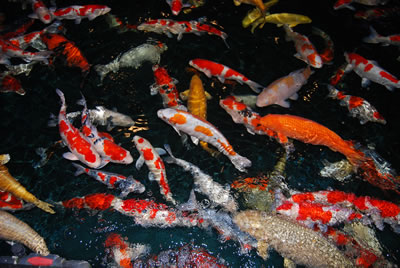
Why does your koi pond smell fishy? Solutions to keeping your pond fresh and clean
A fishy smell in your koi pond?
Koi ponds are one of the most beautiful and pleasing features you can add to your backyard. These ponds not only enhance the beauty of your outdoor space but also create a serene environment that can soothe your senses. However, like any other water feature, your koi pond requires maintenance to keep it looking fresh and clean. One of the common problems faced by pond owners is the fishy smell of the water.
Why does your koi pond smell fishy?
The most common reason why your koi pond smells fishy is the accumulation of fish waste and leftover food in the water. Excess nutrients in the water can promote the growth of algae and bacteria, leading to a smelly pond. Another factor that can cause a fishy smell is poor water circulation and a lack of aeration. This can cause the water to become stagnant and result in an unpleasant odor.
Solutions to keeping your koi pond fresh and clean
1. Regular pond maintenance
The best way to prevent a fishy smell in your koi pond is by proper pond maintenance. This includes regular removal of debris, dead leaves, and excess fish food from the water. You can use a pond skimmer or a net to remove these unwanted substances from the water. A pond vacuum can also be used to clean the bottom of the pond and remove accumulated sludge. Regular water changes are also essential to maintain the water quality of your pond.
2. Use of pond filters
Pond filters are an excellent way to maintain the water quality of your koi pond. A good-quality filter can help remove excess nutrients, debris, and other pollutants from the water. It can also promote the growth of beneficial bacteria that break down organic matter and prevent the growth of harmful bacteria and algae. Make sure to choose the right filter for your pond size, and clean or replace the filter media regularly.
3. Add beneficial bacteria
Beneficial bacteria are a must-have for any koi pond. These bacteria help break down fish waste, excess food, and other organic matter in the water. They also prevent the growth of harmful bacteria and promote a healthy microbial balance in the pond. You can add beneficial bacteria in the form of liquid or powder supplements or by using special filter media that contains beneficial bacteria. Make sure to follow the manufacturer’s instructions when adding beneficial bacteria.
4. Maintain proper water circulation and aeration
Proper water circulation and aeration are essential to maintain a healthy koi pond. Waterfalls, fountains, and air pumps are some of the ways to promote water circulation and aeration in your pond. Aeration helps circulate the water and brings oxygen to the bottom of the pond, preventing the water from becoming stagnant. Proper water circulation also helps distribute nutrients and beneficial bacteria evenly throughout the pond.
5. Avoid overfeeding your koi
Overfeeding your koi can lead to excess fish waste and leftover food in the water, which can cause a fishy smell. Make sure to feed your koi the right amount of food and avoid feeding more than they can eat in a few minutes. You can also feed your koi a specialized diet that produces less waste and is easier to digest.
Conclusion
A fishy smell in your koi pond can be a sign of poor water quality and inadequate maintenance. By following the tips mentioned above, you can keep your pond fresh and clean and eliminate the unpleasant odor. Regular pond maintenance, use of pond filters, addition of beneficial bacteria, proper water circulation and aeration, and avoiding overfeeding your koi can help maintain a healthy and beautiful koi pond.




